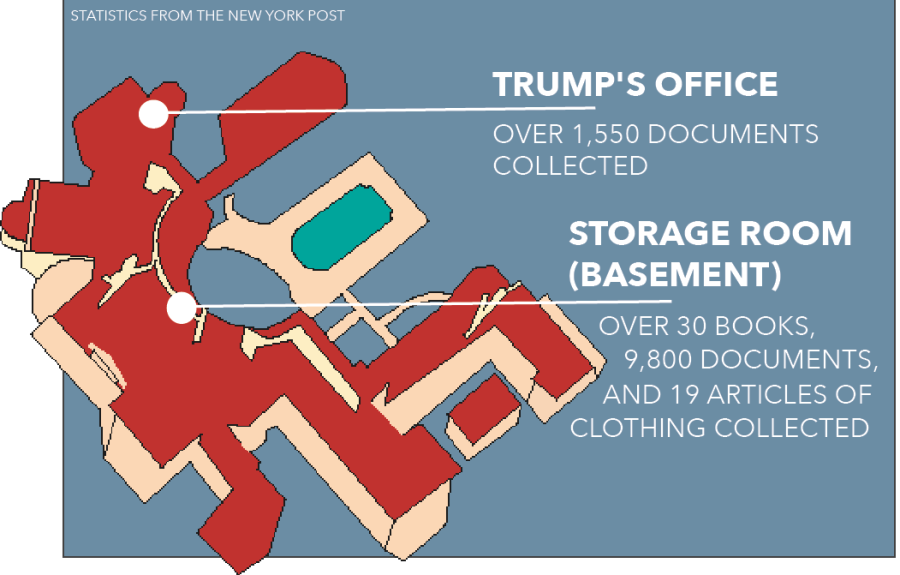Raids on Mar-a-Lago unleash a political storm
On August 8 of this year, former president Trump had his Florida home, Mar-a-Lago, raided by the Federal Bureau of Investigation (FBI).
October 12, 2022
Through the four-year long period of his presidency, controversy and investigations have followed Donald Trump. Even after leaving office, this hasn’t changed. With investigations underway, evidence has suggested new findings surrounding his actions post-presidency.
On August 8 of this year, former president Trump had his Florida home, Mar-a-Lago, raided by the Federal Bureau of Investigation (FBI). After receiving a search warrant, officers entered Mar-a-Lago and removed multiple boxes of confidential and sensitive documents.
“I wasn’t surprised, just because of the things he did during his presidency,” senior Jason Oh said. “But it’s also kind of relieving, because Trump might face criminal charges and be unable to run for office again.”
After Richard Nixon’s presidency, it became illegal for presidents to remove documents from the White House post-presidency. This is the first time the FBI has ever visited a president’s home to retrieve such documents.
“The FBI is always very thorough with its work,” AP government teacher Dalton Pool said. “If they ever do take action, it’s usually because they have plenty of evidence showing them the action is necessary.”
For the FBI to gain the warrant to execute a raid, they must have probable cause, meaning there’s good reason to believe a crime was committed; in this case, that was the smuggling of the files. A judge then decides if there is enough information to issue a warrant.
“To conduct the search that took place in Florida, a federal judge had to approve the warrant,” Pool said. “Warrants must be very specific and detailed as far as what they are looking for and what possible crimes have been committed in order to get approved.”
The Presidential Records Act, ratified in 1978, states that records produced during the term of a President or Vice President belongs not to them, but to the U.S. and the American people.
“The National Archives play a vital role in securing classified documents and keeping them secret until they’re made public decades later, in accordance with the law,” Pool said.
When Trump’s presidency ended back in 2020, 15 boxes of files were reported missing. The National Archives Records Administration (NARA) began conducting an investigation, later demanding that he return the missing documents. He returned some documents, but withheld others.
“It made sense to ‘raid’ his house,” sophomore Olivia Baird said. “ If Trump is taking important documents willy-nilly, then he should know the repercussions. The FBI had good reason to raid his house; if there’s smoke there’s usually fire.”
After the FBI retrieved said boxes, they were met with opposition from Florida judge Aileen Cannon, who was appointed by Trump in April of 2020, just months before his term ended and he left office. She effectively paused the progress of the investigation by ruling that a Special Master had to review the documents before they could proceed with a case.
“That people tried to block the viewing of these documents didn’t really phase me,” Baird said. “If anything, I expected it. Trump has always had a ‘cult-like’ following. It’s no surprise that people are willing to go to such lengths to protect him.”
Trump’s legal team argued that many of these documents have been “declassified,” a claim which is currently being disputed. The FBI argues that they contain sensitive information that needs to be secured.
“When it comes to classified information, we have very specific laws in place to protect national security and national security personnel,” Pool said.
The documents are said to have information related to individuals undercover in other countries. These individuals are at risk of imprisonment, and in some cases execution, if they are found out or exposed.
“This might create distrust from other nations while anyone but Trump is in office; if he gets elected, then I think it’s a bigger problem,” Baird said. “If you tell your friend a secret, and they go telling it to other people, you won’t tell them a secret again.”
The biggest fear from the Intelligence community is that foreign operatives helping the U.S. could be identified by name within these files, which could end up putting them at a potentially life-threatening risk.
“Having strong connections with other countries is really important,” Baird said. “If we can make moves not to compromise, then we should do it.”








